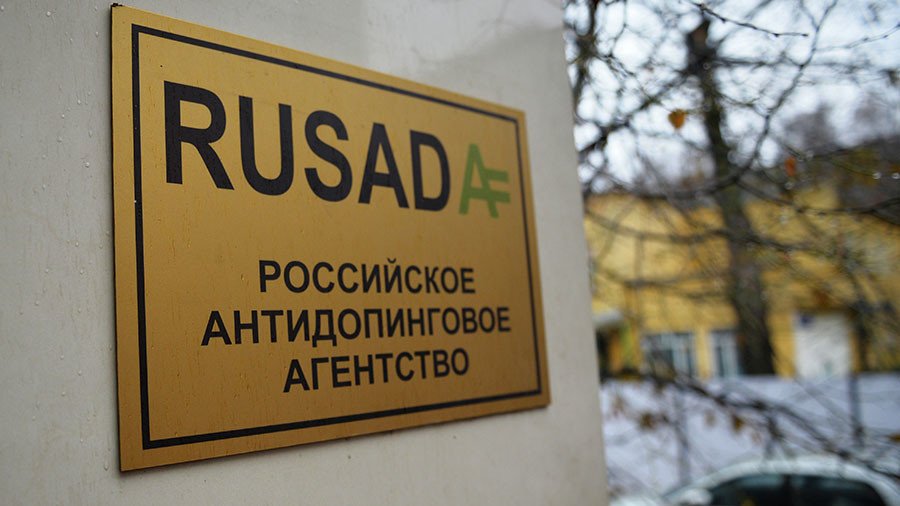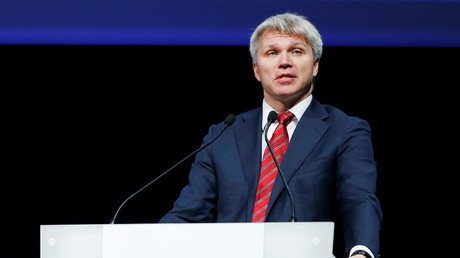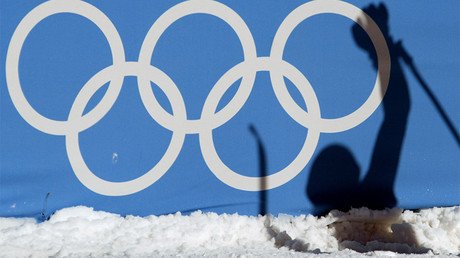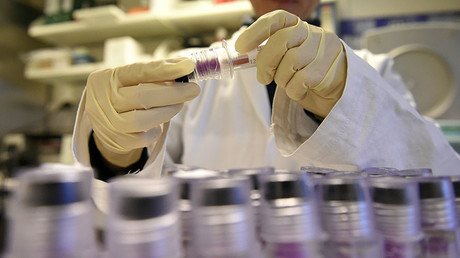WADA foundation board declares Russian anti-doping agency 'non-compliant' with international code

The World Anti-Doping Agency (WADA) has decided at a meeting of its Foundation Board on Thursday against reinstating RUSADA after the Russian organization was declared still “non-compliant” with the WADA code.
"WADA Foundation Board approves the recommendation by the Independent Compliance Review Committee that RUSADA remain non-compliant," WADA wrote on Twitter.
Russian Sports Minister Pavel Kolobkov denounced the decision by WADA’s Foundation Board, saying that the two roadmap demands Russia did not meet, according to the ruling, are politicized. Those are to acknowledge an existence of a state-sponsored doping program in Russia, and to provide access for WADA officers to the sealed Moscow laboratory.
WADA Foundation Board approves the recommendation by the Independent Compliance Review Committee that RUSADA remain non-compliant.
— WADA (@wada_ama) November 16, 2017
“These two demands are obviously of a political nature,” Kolobkov said, as cited by R-Sport.
On Thursday, following the WADA meeting in South Korea, the organization’s chairman, Craig Reedie, confirmed that RUSADA was declared non-compliant with the WADA code. However, some improvements in the Russian anti-doping system have been made, he added.
“Having set a road map for compliance, there are two issues that have to be fulfilled and we can’t walk away from the commitments,” Reedie said.
The head of the Russian Olympic Committee (ROC), Alexander Zhukov, suggested that the Compliance Review Committee chaired by Jonathan Taylor is devising false pretexts to keep RUSADA suspended. “Taylor’s committee has been inventing reasons not to reinstate RUSADA; the accusations against RUSADA are simply a joke!” Zhukov said, as cited by R-Sport.
Taylor is also a consultant of the Russian Paralympic Committee (RPC) and The International Association of Athletics Federations (IAAF), Kolobkov said. "The biggest problem is that Taylor is consulting the RPC and the IAAF, which can prevent the restoration of the RPC, of course, one person cannot be a judge and an investigator at the same time," Kolobkov told the media.
Zhukov admitted that the situation with RUSADA is close to a stalemate, as Russia is never going to accept the allegation it is running a state-sponsored doping scheme, as claimed in Richard McLaren's Independent Investigation Report.
"It's a deadlock, we do not recognize the report, they do not withdraw the demand,” he said.
RUSADA could still be reinstated before the Winter Olympics kick off in February, according to the Head of the Sport Conventions of the Council of Europe Sergey Krychikov.
“A normal procedure involves a decision at a meeting of the Foundation Committee, but the decision can be also made through a written procedure,” Krychikov said, as cited by TASS. He added that it’s “theoretically possible” that the voting could take place before Olympics.
Earlier, Russian Deputy Prime Minister Vitaly Mutko stated that no matter what WADA decided on RUSADA’s status, it will not affect Russia’s participation in the Olympics, as the latter is “a prerogative of the International Olympic Committee (IOC), not WADA.”
A decision on Russia may be made at the next IOC Executive Board meeting in Lausanne scheduled for December 5. At the meeting, the members are expected to review a report into the alleged state-sanctioned doping system in Russia by a commission led by Swiss politician Samuel Schmid.
The McLaren report
The Russian Anti-Doping Agency (RUSADA) was initially declared non-compliant with the WADA code following a damning report by WADA’s Independent Commission in November 2015, that alleged a widespread and systematic use of performance enhancing drugs by Russian athletes. As a result, the Russian track and field team was banned from the 2016 Rio Olympics and RUSADA was stripped of its international accreditation. WADA later laid out a roadmap for RUSADA to be reinstated, with one of the key demands being that Russia must publicly accept the findings of the WADA-commissioned investigation by Richard McLaren of July 2016, implying an existence of a state-sponsored doping system in Russia.
The second part of the report, released in December 2016, claimed that over 1,000 Russian athletes including summer, winter and Paralympic competitors were involved in the state-sponsored doping scheme. Without disclosing any names, McLaren then claimed that samples of 12 Russian medalists from 2014 Sochi Olympics were tampered with.
In the wake of the report, an International Olympic Committee Disciplinary Commission chaired by Denis Oswald was established to re-analyze the samples for traces of potential foul play. Based on the commission’s findings early November, the IOC annulled the results of six Russian skiers in Sochi and barred them from competing in any future Winter Olympic games. IOC pointed to the anti-doping rules violations allegedly committed by the athletes, without specifying their kind.
Among those banned is the winner of men’s 50km marathon Alexander Legkov, Maxim Vylegzhanin, a silver medalist in men’s team sprint and marathon, as well as Evgeniy Belov, Evgenia Shapovalova, Julia Ivanova and Alexey Petukhov.
Vylegzhanin and Legkov have announced they are appealing the decision to the Court of Arbitration for Sport (CAS), with the president of Russia’s Cross-Country Skiing Federation, Elena Valbe, telling RT that the organization will “fight until the last drop of blood” to prove the innocence of the skiers.
In June, RUSADA, was granted permission to run and plan tests in Russia for the first time since its suspension, although under oversight of international WADA experts and the officers of the UK Anti-Doping Agency (UKAD).
WADA Director General Olivier Niggli, who visited RUSADA Moscow headquarters in July, commended the changes that have been made by the organization to meet the WADA criteria, saying that it “goes in the right direction.”
In August, Mutko said he did not see any problems for Russia in implementing the WADA criteria. He admitted that while there were some failures within the Russian anti-doping system, no state-run doping program designed to arrange and cover up the usage of banned substances ever existed in Russia.















